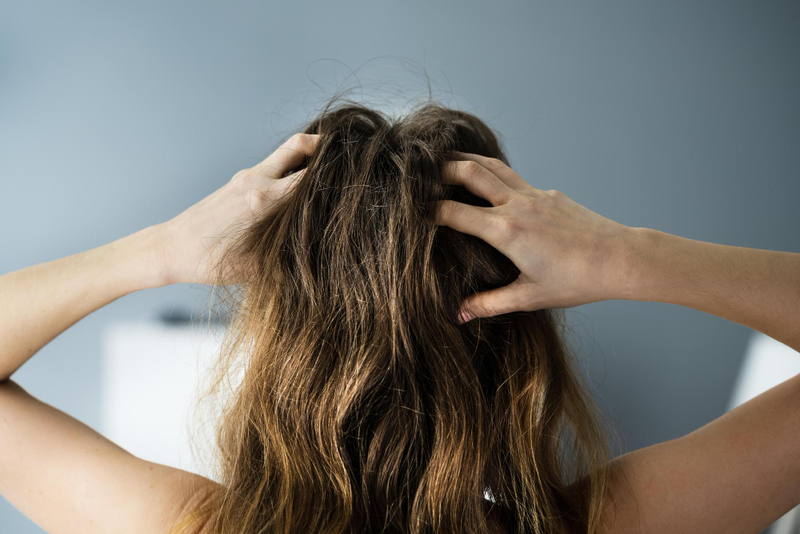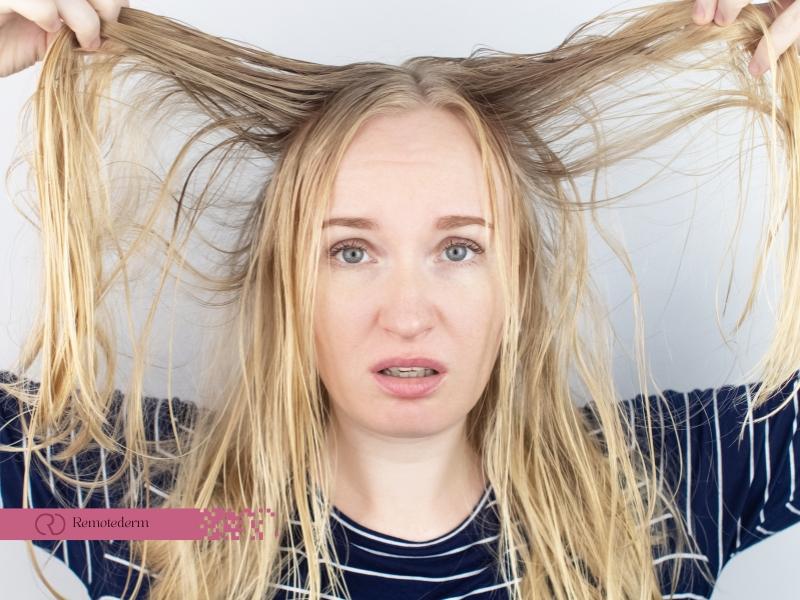Dealing with an oily scalp in Canada goes beyond just cosmetic concerns—it can cause discomfort, itchiness, and even lead to hair loss. In this comprehensive guide, we explore the root causes of an oily scalp, including hormonal imbalances, genetics, and environmental factors common in Canadian climates. Understanding these factors is key to effective treatment and long-term management. We also dive into the symptoms of oily scalp and how untreated oiliness can affect your hair health. Plus, discover practical solutions and professional treatment options that will help you maintain a healthy, balanced scalp year-round, no matter the weather.
Why is my scalp oily?
An oily scalp can be a persistent nuisance, leading to discomfort, itchiness, and even hair loss if left untreated. Understanding the root causes of oily scalp is the first step towards effective treatment. Several factors contribute to excess oil production on the scalp, including hormonal imbalances, genetics, environmental factors, and lifestyle habits.
Hormonal Imbalances and Oily Scalp
Hormonal fluctuations, particularly during puberty, menstruation, pregnancy, and menopause, can trigger an increase in sebum production. Androgens, such as testosterone, play a significant role in regulating sebum secretion. When hormone levels fluctuate, it can lead to overactive sebaceous glands, resulting in an oily scalp.
Genetic Predisposition and Oily Scalp
Genetics also play a crucial role in determining sebum production levels. Individuals with a family history of oily scalp or overactive sebaceous glands are more likely to experience excessive oiliness themselves. While genetic predisposition cannot be changed, effective management strategies can help control oil production and minimize its effects on the scalp.
Symptoms and Effects of Oily Scalp
Recognizing the symptoms of an oily scalp is crucial for timely intervention and effective management. Understanding the common signs associated with oily scalp can facilitate early treatment and prevent potential complications. Here are some key indicators to look out for:
- Excessive Oiliness: One of the primary manifestations of an oily scalp is the noticeable greasiness and shine that develops shortly after washing. Despite regular cleansing, the scalp may appear slick and oily, which can be bothersome and aesthetically displeasing.
- Itchiness and Discomfort: Oil buildup on the scalp often leads to sensations of itchiness and discomfort. The accumulation of excess sebum can irritate the scalp, causing a persistent urge to scratch. This itchiness is frequently accompanied by flakiness, as the scalp tries to shed the accumulated oil and dead skin cells.
- Hair Loss and Thinning: Prolonged oiliness can exacerbate hair loss and thinning. The excess sebum produced by the scalp can clog hair follicles, impeding the natural growth cycle of hair strands. Over time, this obstruction can weaken the hair roots and contribute to increased hair shedding, resulting in noticeable thinning of the hair volume and density.

Furthermore, untreated oily scalp can heighten the susceptibility to developing other scalp conditions, including seborrheic dermatitis. This inflammatory skin disorder is characterized by redness, swelling, and persistent dandruff formation. The presence of excess oil creates an optimal environment for the proliferation of Malassezia yeast, exacerbating the symptoms of seborrheic dermatitis.
How to Treat Oily Scalp Effectively?
Managing oily scalp requires a comprehensive approach that addresses underlying causes and symptoms. Here are some effective strategies to treat and control oily scalp:
Proper Hair Care Routine
Establishing a regular hair care routine is crucial for managing oily scalp. Use a gentle, clarifying shampoo specifically formulated for oily hair to cleanse the scalp and remove excess oil buildup. Avoid over washing, as it can strip the scalp of its natural oils, leading to increased oil production as a compensatory mechanism.
Balanced Diet and Hydration
Maintaining a diet rich in vitamins, minerals, and antioxidants is key to overall scalp health. Include omega-3 fatty acid-rich foods like salmon, flaxseeds, and walnuts to regulate sebum production and reduce inflammation. In Canada’s dry winters and humid summers, staying hydrated is crucial—drink plenty of water throughout the day to maintain scalp hydration and balance.

Stress Management Techniques
Stress can exacerbate hormonal imbalances and trigger excess oil production on the scalp. Practice stress management techniques such as meditation, yoga, deep breathing exercises, or engaging in hobbies to reduce stress levels and promote scalp health.
Professional Treatment Options
For those grappling with noticeable hair loss or grappling with scalp concerns like seborrheic dermatitis, consulting a dermatologist is highly recommended. Dermatologists are equipped with the knowledge to pinpoint the issue accurately and offer suitable remedies. They can prescribe specialized medicated shampoos, topical treatments, or oral medications customized to regulate oil production, reduce inflammation, and address symptoms effectively. Seeking professional assistance guarantees thorough care and specific treatments for addressing hair loss and related scalp conditions, including the convenience of accessing your online hair loss prescription.
Final Thoughts
Tackling an itchy, oily scalp requires patience, consistency, and a personalized approach to scalp care. By understanding the root causes and recognizing the symptoms of an oily scalp, you’ve taken the first step towards restoring balance and regaining scalp health. Remember, effective treatment is multifaceted, including a proper hair care routine, a balanced diet, stress management, and, when needed, professional advice. In Canada, where seasonal weather changes can affect scalp health, adopting these strategies along with localized care will help you maintain a healthy, vibrant scalp. Embrace the opportunity to prioritize your scalp’s well-being and unlock the benefits of proactive scalp care for shiny, luscious locks.
FAQs
1. Can stress worsen the symptoms of an itchy oily scalp?
Yes, stress can exacerbate scalp oiliness and itchiness due to hormonal imbalances. Managing stress through techniques like meditation can help alleviate symptoms.
2. Are there any dietary factors that may contribute to an itchy oily scalp?
Yes, a diet high in processed foods and sugars can worsen scalp inflammation and oiliness. Opting for foods rich in omega-3 fatty acids and antioxidants may help regulate oil production.
3. Can environmental factors impact the severity of an itchy oily scalp?
Yes, factors like humidity and pollution can increase oil production and scalp irritation. Protecting the scalp and using gentle cleansing products can help reduce these effects.
4. Can medications worsen symptoms of an itchy oily scalp?
Yes, certain medications, like hormonal treatments, may disrupt oil balance on the scalp. Discussing concerns with a healthcare provider can help explore alternative treatments.
